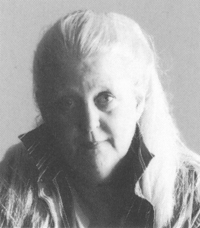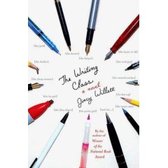 Jincy Willett is one of the few authors from which just the prospect of a new piece of work makes me insane with anticipation. (Stacey Richter and Karen Joy Fowler are two others.) This began when I discovered her short story collection, Jenny and the Jaws of Life, which was brought back into print through the generous good taste of David Sedaris; it’s one of the most perfect collections I’ve ever encountered. Her follow-up novel, Winner of the National Book Award, has, I think you’ll concur, the best title in history, and also had a memorable cast of oddball characters. Her latest, The Writing Class, is an unbelievably rich comic mystery based around a community college writing course—it instantly became one of my favorite books ever. I’m hoping that it will bring her the wider readership that she deserves, because she is that rare gift: a truly literary writer who is at the top of her craft and, also, a fun read.
Jincy Willett is one of the few authors from which just the prospect of a new piece of work makes me insane with anticipation. (Stacey Richter and Karen Joy Fowler are two others.) This began when I discovered her short story collection, Jenny and the Jaws of Life, which was brought back into print through the generous good taste of David Sedaris; it’s one of the most perfect collections I’ve ever encountered. Her follow-up novel, Winner of the National Book Award, has, I think you’ll concur, the best title in history, and also had a memorable cast of oddball characters. Her latest, The Writing Class, is an unbelievably rich comic mystery based around a community college writing course—it instantly became one of my favorite books ever. I’m hoping that it will bring her the wider readership that she deserves, because she is that rare gift: a truly literary writer who is at the top of her craft and, also, a fun read.
GB: The first question I always ask is process porn, and that seems particularly fitting given that the writing process is such a huge part of The Writing Class. So, tell me a little bit about how you wrote this book—was it different than your first novel, or difficult to take on the unguessable plot requirements of a mystery? How long did it take you to write?
JW: What was hard about it was the huge cast of characters. I’m used to working with a handful. In this book, there were so many that I felt like one of those plate spinners on the Ed Sullivan Show—I had to keep rushing back and forth from character to character, twirling them to keep them animate.
What’s hard about a mystery isn’t the unguessable plot; that turns out to be much more mechanical than I imagined ahead of time. You keep an ample supply of red herrings on hand, you keep your eye on the prize (the Big Reveal), and so on.
What’s hard is getting a character to do truly awful things. It’s funny—as a reader, I have no problem relaxing into a mystery or thriller and pretending that engaging, seemingly reasonable people who give off not a whiff of madness or psychopathy can just turn on a dime and whale away on some poor soul with a blunt instrument. But when I was the one in charge of things I was paralyzed, sometimes for months, by what I had to make the Sniper do. I had a hard time imagining it (not to mention imagining why the class would continue to meet, in the middle of all that mayhem). Writing’s pretty easy, really; imagining is what kills you.
Which is why this book took three or four years to write, rather than the one year it was supposed to. I expected just the opposite—that because it was “genre,” it would be a piece o’ cake. Wrong. St. Martin’s, by the way, was extremely nice about this.
GB: One of the things I love best about the book is how the reader almost becomes an invisible member of the class. At the beginning, we’re firmly with Amy and absolutely agreeing with her judgments on everyone. Just like a real writing class, people get slotted into types very easily, based on their tastes and style. And then, as the novel progresses, everyone becomes more real as we get to know them. How did you approach the characters? It’s the perfect mix of people.
we get to know them. How did you approach the characters? It’s the perfect mix of people.
JW: One thing I did not do was base any of them on real students of mine. I have to say this up front, because I’ve taught a lot of workshops and still teach once in a while, and I’d hate for anyone to think herself the inspiration for Dot, or for some guy to imagine himself a thinly disguised Syl Reyes. Still, it helped to teach all those classes; I don’t remember having any trouble coming up with class members. It happened so fast that I wasn’t aware of any sort of “approach.” The tough part was writing their fiction.
I’m glad that you found them more complex as you went along. The aim, always, is for round characters, or, in this case, a hint of roundness in the two-dimensional ones. I worried that they might be all flat. (Those flat, twirling plates!)
GB: What do you say to the conspiracy theorists who are convinced that Amy Gallup is you?
JW: Scott Fitzgerald said that he was all his characters. [I’ve tried to track down the quote and can’t. I’m pretty sure I didn’t dream it.] I don’t know about other writers, but I’m only free to explore a major character in depth if it’s in some way based on some aspect of me. There has to be at least one common denominator. The character doesn’t have to share my personal history in any way, of course. Think of your self (or your concept of your self) as a ball of dough. You just break off parts of it and fashion them into different shapes. Amy is probably more recognizably me than most of my characters, but our formative experiences are quite distinct. My past absolutely belongs to me; I would never use it in fiction. My character is up for grabs.
GB: This is one of the funniest books I’ve ever read, and one of the things it’s most hilarious on is the Internet and blogs (kibbitzers!). Do you read a lot of stuff online? Have any favorite sites? Why is there such a lack of quality list-making?
JW: If you go to my own site, www.jincywillett.com, you’ll see where these lists came from, and also links my own favorite internet sites. I try not to spend a whole lot of time reading web pages, because I work as an online tutor, and at the end of a typical day my eyes are shot.
Most blogs actually aim to communicate; Amy’s doesn’t, and neither does mine. Like Amy, I’m always stunned—and pleased—when somebody posts a response. It’s lovely when it happens, but basically the blog is, for me, a solipsistic enterprise.
GB: David Sedaris famously got your amazing collection, Jenny and the Jaws of Life, brought back into print. What book(s) would you rescue from out of printland if you could?
JW: All of Robert Benchley, collected in a single volume.
GB: Thanks for the interview, Jincy, and now y’all please go buy and read her WONDERFUL book.
The rest of the day’s SBBT stops:
Varian Johnson at Finding Wonderland (Vermont College represent!)
John Grandits at Writing & Ruminating
Meg Burden at Bookshelves of Doom
Gary D. Schmidt at Miss Erin
Javaka Steptoe at Seven Impossible Things
Mary Hooper at Interactive Reader
And yesterday’s are here (we were driving to Madison and I didn’t get a chance to post them).
I must track down The Writing Class, for sure! Thanks for the interview, ladies.
I lovelovelove the plate-spinning analogy, and Ms. Willett has one of the more entertaining author websites I’ve seen Now I’m super-intrigued. Thanks, Gwenda and Jincy!